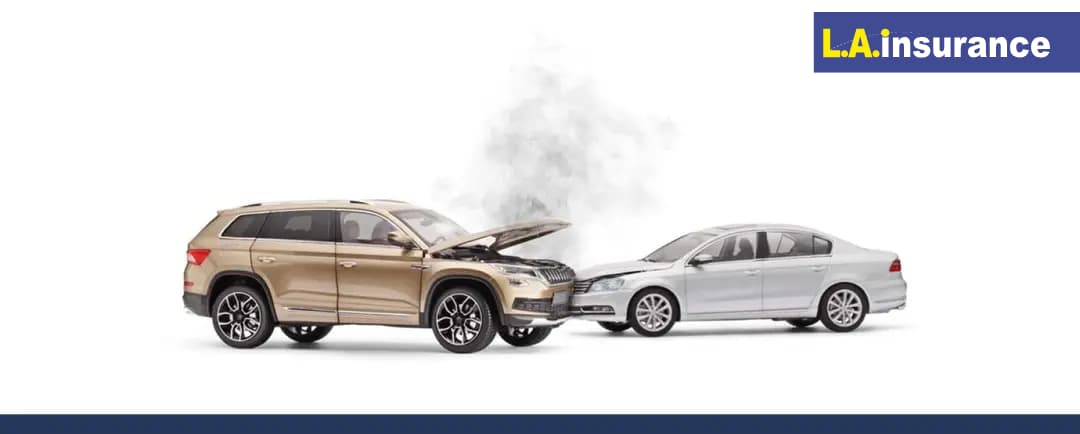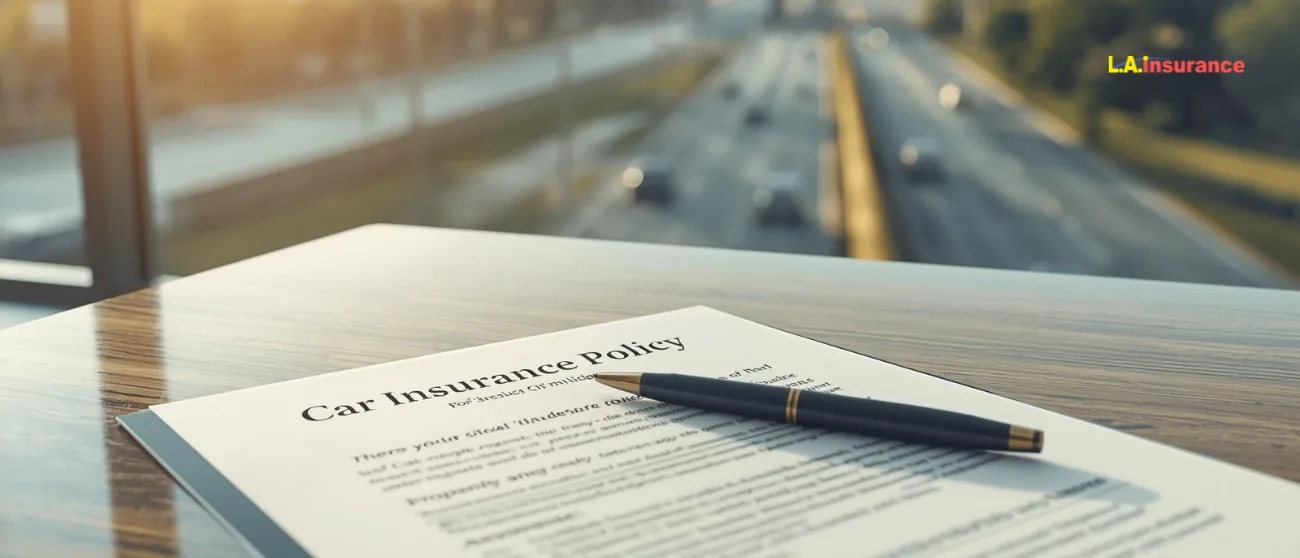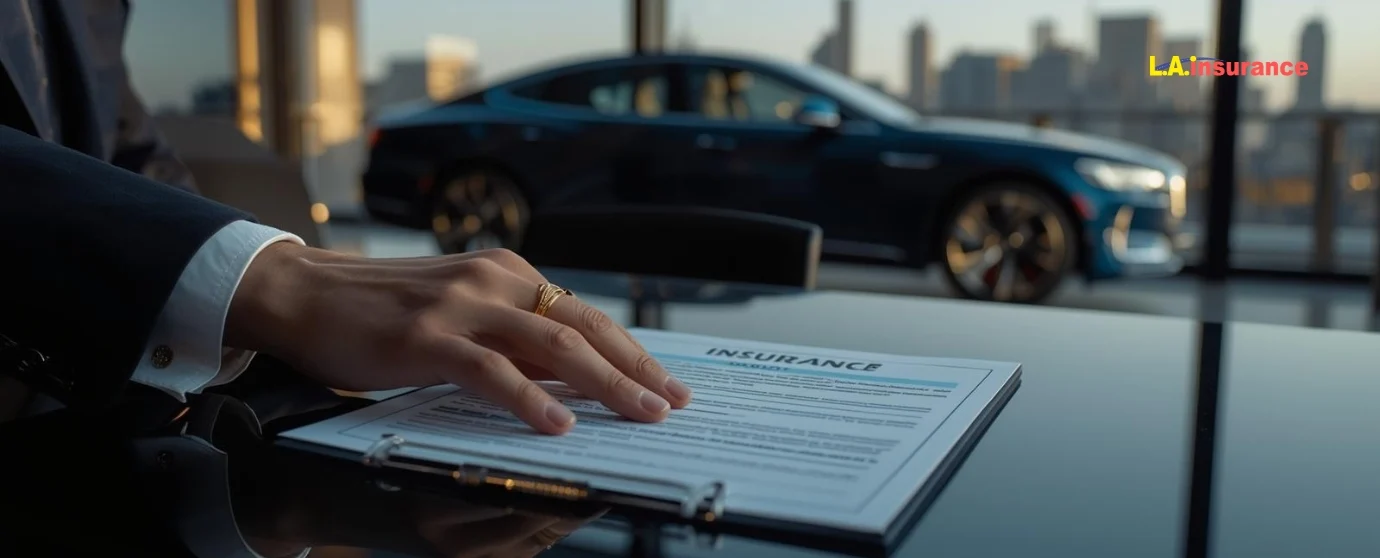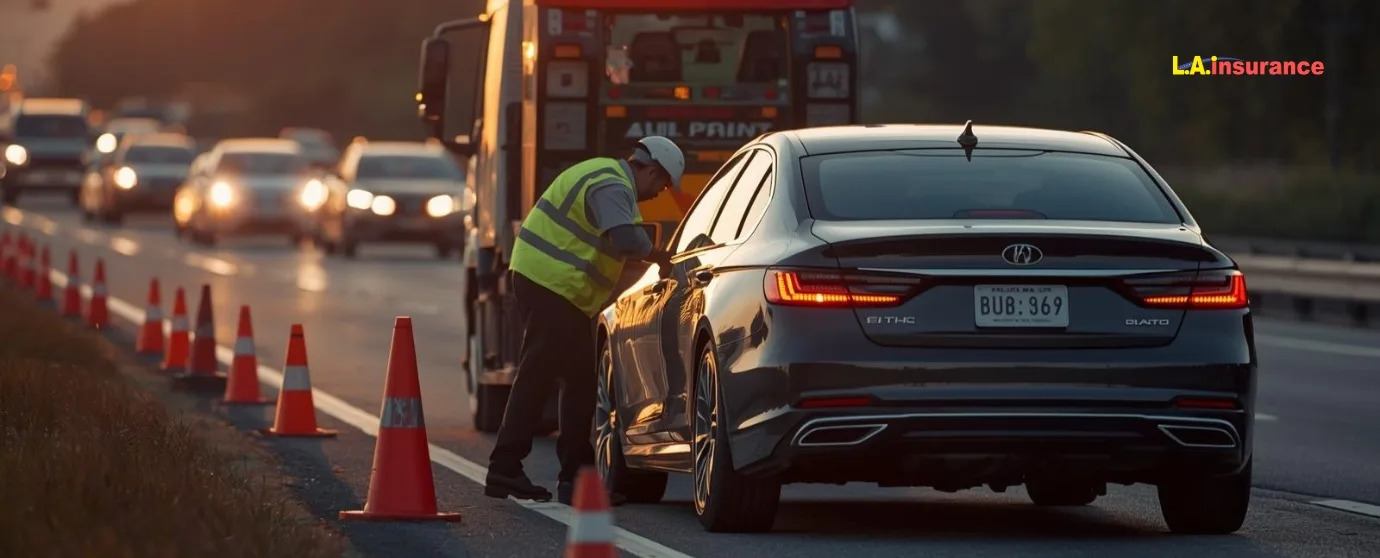
Publish Date: 11-08-2024
Auto Insurance
Last Updated: 18-12-2025
How Much Does Car Insurance Go Up After an Accident?
Car insurance premiums often rise after an accident, but how much of an increase should you expect? On average, drivers with a single at-fault accident on their record see their rates go up by about $872 per year, according to a U.S.News & World Report analysis. That’s a jump from the national average of $2,068 to $2,940 per year. Based on L.A. Insurance research, your annual premium will likely increase by $367 to $911 if you cause an accident.
The exact rate can only be determined after considering factors like your location, driving history, the severity of the accident, and your insurance provider. All these play a role in how much your insurance rate will rise. For instance, drivers in some states may experience higher increases due to state-specific regulations, while others might not see much of a change if they have accident forgiveness or a clean driving record.
In this article, we’ll break down how car insurance rates change after an accident, explain the differences between at-fault and no-fault accidents, and analyze state-by-state variations. We’ll also cover the factors that influence premium increases, explain accident forgiveness, and provide actionable tips on how to reduce your rates after an accident.
How Your Car Insurance Rate Is Affected by an Accident
Car insurance premiums go up because insurers see an accident as a sign of higher risk. When you file a claim, your insurer reviews the details and adjusts your rate based on how likely you are to have another claim. The increase can vary widely, but at-fault accidents tend to trigger the biggest changes.
Most drivers see their premiums rise by 20% to 50% after an at-fault accident. So, as we said earlier, if we translate this, you’ll likely face a $367 to $911 increase per year on average.
However, the impact depends on the severity of the crash, the cost of the claim, your past driving record, and state laws. If you carry accident forgiveness, your rate may not rise after your first qualifying accident.
In short, your rate changes because insurers reassess your risk level. The cleaner your record, the less the accident may affect your price.
Difference Between at-Fault and No-Fault Accident
An at-fault accident is a situation where you’re responsible for causing the crash. In these cases, your insurance company usually pays for the damages, and your rate may go up because insurers now see you as a higher-risk driver.
A no-fault or not-at-fault accident is when you didn’t cause the crash. Here, the other driver’s insurance typically pays for the damage. Even then, your premium could still rise because some insurers treat any accident as a higher-risk event.
Some states follow no-fault insurance laws, which means each driver’s insurance pays for their own medical bills, no matter who caused the accident. These laws are meant to speed up claims and reduce lawsuits. However, no-fault laws do not always protect you from a rate increase, because insurers still review risk after any claim.
Current no-fault states:
- Florida
- Hawaii
- Kansas
- Kentucky
- Massachusetts
- Michigan
- Minnesota
- New Jersey
- New York
- North Dakota
- Pennsylvania
- Utah
These 12 states require drivers to carry PIP coverage as part of their auto insurance. Since insurance laws change often, it’s always a good idea to speak with a local agent to confirm what your state requires.
How Much Does Insurance Go Up After You’re at fault in an Accident?
As we said, when you’re at fault in an accident, your insurance rate usually goes up. The amount varies by insurer, your state, and the details of the crash. If it’s your first accident, some companies may offer accident forgiveness, which prevents an immediate rate increase.
For most drivers, the increase becomes noticeable after a second or later accident. The severity of the crash, the size of the claim, and your driving history all influence the final price change. According to Bankrate, rates rise by 43% for minimum coverage and 47% for full coverage after an at-fault accident.
ValuePenguin reports that many drivers pay about 50% more after causing an accident, which equals roughly $87 more per month for full coverage. MarketWatch found that premiums for full coverage car insurance can increase by about $911 per year or around $76 per month after an at-fault claim.
Your location and insurer also play a major role in how much your rate changes. State regulations, claim trends, and company underwriting rules all influence how insurers calculate risk. If you’re concerned about rising premiums, consider taking a defensive driving course or comparing quotes from multiple insurers.
How Much Does Car Insurance Go Up After an Accident: Rates by State
Car insurance rates can vary significantly across states, and the increase after an accident is no exception. Understanding these differences is essential for drivers as state laws, regulations, and insurance company practices all play a role in determining how much your premiums will rise. Below is a state-by-state breakdown of typical premium increases after an accident:
|
State |
Clean Driving Record |
One Recent Accident |
% Increase |
Amount Increase |
|
Alabama |
$1,775 |
$2,498 |
41% |
$723 |
|
Alaska |
$1,685 |
$2,248 |
33% |
$563 |
|
Arizona |
$2,008 |
$2,938 |
46% |
$930 |
|
Arkansas |
$2,038 |
$3,001 |
47% |
$963 |
|
California |
$2,313 |
$4,085 |
77% |
$1,772 |
|
Colorado |
$2,173 |
$3,040 |
40% |
$867 |
|
Connecticut |
$1,919 |
$2,699 |
41% |
$780 |
|
Delaware |
$2,881 |
$3,893 |
35% |
$1,012 |
|
Florida |
$3,244 |
$4,608 |
42% |
$1,364 |
|
Georgia |
$1,973 |
$2,931 |
49% |
$958 |
|
Hawaii |
$1,656 |
$2,306 |
39% |
$650 |
|
Idaho |
$1,402 |
$2,057 |
47% |
$655 |
|
Illinois |
$1,541 |
$2,193 |
42% |
$652 |
|
Indiana |
$1,587 |
$2,333 |
47% |
$746 |
|
Iowa |
$1,563 |
$2,086 |
33% |
$523 |
|
Kansas |
$1,918 |
$2,924 |
52% |
$1,006 |
|
Kentucky |
$2,522 |
$3,655 |
45% |
$1,133 |
|
Louisiana |
$3,040 |
$4,423 |
45% |
$1,383 |
|
Maine |
$1,238 |
$1,796 |
45% |
$558 |
|
Maryland |
$1,833 |
$2,958 |
61% |
$1,125 |
|
Massachusetts |
$2,430 |
$4,043 |
66% |
$1,613 |
|
Michigan |
$3,643 |
$5,204 |
43% |
$1,561 |
|
Minnesota |
$1,766 |
$2,528 |
43% |
$762 |
|
Mississippi |
$1,658 |
$2,603 |
57% |
$945 |
|
Missouri |
$2,104 |
$2,992 |
42% |
$888 |
|
Montana |
$1,979 |
$2,848 |
44% |
$869 |
|
Nebraska |
$1,871 |
$2,679 |
43% |
$808 |
|
Nevada |
$2,788 |
$4,112 |
47% |
$1,324 |
|
New Hampshire |
$1,362 |
$2,088 |
53% |
$726 |
|
New Jersey |
$2,513 |
$4,127 |
64% |
$1,614 |
|
New Mexico |
$1,943 |
$2,720 |
40% |
$777 |
|
New York |
$2,088 |
$2,863 |
37% |
$775 |
|
North Carolina |
$1,627 |
$2,756 |
69% |
$1,129 |
|
North Dakota |
$1,916 |
$2,431 |
27% |
$515 |
|
Ohio |
$1,599 |
$2,341 |
46% |
$742 |
|
Oklahoma |
$2,278 |
$3,066 |
35% |
$788 |
|
Oregon |
$1,925 |
$2,945 |
53% |
$1,020 |
|
Pennsylvania |
$1,981 |
$2,820 |
42% |
$839 |
|
Rhode Island |
$2,357 |
$2,605 |
11% |
$248 |
|
South Carolina |
$1,845 |
$2,496 |
35% |
$651 |
|
South Dakota |
$2,291 |
$3,300 |
44% |
$1,009 |
|
Tennessee |
$1,524 |
$2,227 |
46% |
$703 |
|
Texas |
$2,205 |
$3,365 |
53% |
$1,160 |
|
Utah |
$1,928 |
$2,855 |
48% |
$927 |
|
Vermont |
$1,199 |
$1,722 |
44% |
$523 |
|
Virginia |
$1,781 |
$2,636 |
48% |
$855 |
|
Washington |
$1,616 |
$2,320 |
44% |
$704 |
|
Washington, D.C. |
$2,218 |
$3,235 |
46% |
$1,017 |
|
West Virginia |
$2,177 |
$3,195 |
47% |
$1,018 |
|
Wisconsin |
$1,694 |
$2,516 |
49% |
$822 |
|
Wyoming |
$1,702 |
$2,305 |
35% |
$603 |
Source: MarketWatch | As of December 2025
Will My Car Insurance Premium Increase If I’m Not At-fault?
Even if you’re not at fault, your insurance rates may still go up after an
accident. Insurers view any accident as an indicator of higher risk, and in
some cases, premiums can increase by 10%. However, this depends on factors like
your insurer, state laws, and whether you have accident forgiveness.
Learn More: Does No Fault Accident Affect Insurance in the Future?
How Long Does an Accident Last on Your Record?
An accident typically stays on your driving record for 3 to 5 years, depending on your state’s laws and insurance policies. For example:
- Michigan: Points from an accident remain on your driver’s license for 2 years, but any conviction related to the accident stays on your record for 7 years (via Michigan Auto Law).
- California: The accident stays on your record for 3 years from the date of the accident.
- New York: It remains on your record for 3 years from the end of the accident year.
- New Hampshire and Oregon: The accident stays on your record for at least 5 years.
During
this period, your insurance premiums may increase as insurers assess the added
risk. Once the accident is removed from your record, your rates may decrease,
provided no further incidents occur. Always check with your local DMV and
insurance provider for specific rules in your state.
If an Accident Occurs, Learn How to Find Out If Someone Has Auto Insurance
What Factors Can Impact My Premiums After a Claim?
Auto insurance is mandatory in most states, and many policyholders want to understand what affects their premiums after a claim. Several important factors determine how much your rate may increase:
- Fault: If you’re at fault in an accident, your premium usually goes up.
- Claim Severity: Larger or more expensive claims often lead to bigger rate increases.
- Driving Record: A clean record can lessen the impact, but multiple claims or violations can raise your rates significantly.
- Location: Rates vary by state and city due to different risks, repair costs, and insurance regulations. Florida, for example, is one of the most expensive states for auto insurance.
- Risk Pool: Insurers evaluate the overall risk of the group of drivers you’re grouped with, which can influence your rate after a claim.
- Policy Type: Full coverage car insurance policies typically see higher increases than minimum coverage after an accident.
- Age and Experience: Younger and less experienced drivers often face larger increases because insurers view them as higher-risk.
Can I Prevent My Car Insurance Rate from Increasing After an Accident?
Yes, there are steps you can take to prevent your car insurance rate from increasing after an accident. One option is to ask your insurer about accident forgiveness, a feature some companies offer that can prevent your first at-fault accident from affecting your premiums.
Other ways to help manage your rates include:
- Maintaining a clean driving record and practicing safe driving habits.
- Taking a defensive driving course, which could qualify you for a discount. Reporting the accident promptly and cooperating fully with your insurer.
- Raising your deductible to help lower your premiums.
- Always shopping around for the best rates by comparing quotes from multiple insurers.
Pro Tips: To manage your insurance costs effectively, take as little risk as possible and be a responsible driver.
Learn more: When does car insurance go down?
What Is Accident Forgiveness and How Can It Help?
Accident forgiveness is a feature some insurers offer to protect you from a rate increase after your first at-fault accident. When this applies, the insurer won’t count the accident against your driving record, which means your premium stays the same.
Most companies require a clean driving history to qualify, but some may include it automatically, while others charge extra as an add-on. It’s a helpful tool because a single accident can cause a major jump in your rates. With accident forgiveness, you can avoid that spike and manage your insurance costs more confidently.
If you’re unsure whether you have it, ask your insurer or your local agent to review your policy.
How Do I Lower My Insurance Cost After an Accident?
If you need to file a claim on your auto policy, you might be wondering how to lower your insurance costs after an accident. Here are some effective strategies:
- Switch Insurers: Consider switching to a different insurance company to find potentially cheaper rates. Many experts suggest this can save you money, especially after an accident.
- Update Your Coverage: Adjust the limits and terms of your auto insurance policy. For example, raising your car insurance deductible can lower your premiums. For instance, if you have an old or low-end vehicle, you can drop collision insurance to lower your premium. But be careful not to lower your coverage too much and make sure to always maintain state minimum liability auto coverage.
- Take a Driving Course: Completing a defensive driving or driver education course may help you qualify for discounts, particularly if you're a younger or older driver.
- Ask About Accident Forgiveness: Some insurers offer accident forgiveness programs. If you qualify, this can prevent a rate hike after your first accident.
- Improve Your Credit Score: Paying bills on time and reducing debt can help improve your credit score, which may lead to lower premiums. Learn cost of car insurance based on credit score.
- Look for Discounts: Many insurers offer discounts for things like safe driving, vehicle safety features, or memberships in specific organizations. Be sure to ask about all available discounts.
- Shop Around: Always compare quotes from multiple insurance providers. Since each company calculates premiums differently, you may find better rates elsewhere.
- Learn more ways to lower your car insurance rate.
The Bottom Line
After an accident, car insurance rates generally go up, with the average increase around 20% to 50%. However, the exact amount can vary significantly based on factors like the severity of the accident, your driving history, and the specific policies of your insurer. As a policyholder, it’s crucial to understand how an accident might impact your premiums and explore options to manage the increase. You can shop around for better rates, look into accident forgiveness programs, or consider adjusting your coverage to mitigate the impact. Always review your options and stay informed to keep your insurance costs in check.
Frequently Asked Questions
1. Will My Car Insurance Rate Increase If I’m Not at Fault for the Accident?
Ans: Yes, your car insurance rate can still go up even if you’re not at fault for the accident. Auto insurance companies may raise rates because you’re now seen as a higher risk. However, some vehicle insurance providers might offer accident forgiveness programs that can assist you in managing insurance costs effectively.
2. What Happens to Insurance Policy If I am Caught Driving Under the Influence (DUI)?
Ans: If you’re caught driving under the influence of any drugs or alcohol, your insurance provider may put you DUI offender list and consider you as a high-risk driver. Therefore, they can also charge you higher rates for your car insurance policy.
3. How Does Property Damage Affect My Insurance Policy?
Ans: Property damage can increase your insurance policy premiums. When you file a claim for property damage, it signals to your insurer that you’re at a high risk, potentially leading to higher rates.
4. How Much Does Insurance Increase After a Claim?
Ans: Car insurance typically increases by 20-50% after a claim. It also potentially cancels out any no-claims discounts, even with protection, premiums may rise because no-claim discounts represent a reduction from the base premium. Learn more about how to file a claim after a car accident.
5. How Much Does Car Insurance Go Up After Two Accidents?
Ans: You’ll see a significant increase in auto insurance premiums after multiple accidents. The exact rates can depend on many factors including the insurance company, location, and driving history. Multiple accidents signal higher risk to insurers which ultimately result in substantial premium hikes.
Sources:
- Van Keuren, M., & Yao, S. (2025, August 1). How much does insurance go up after an accident? US News & World Report. https://www.usnews.com/insurance/auto/car-insurance-increase-accident
- Kim, G. (2025, November 1). How much will my car insurance go up after an accident? Bankrate. https://www.bankrate.com/insurance/car/rates-after-an-accident/
- Bishop, L. (2025, September 23). How much will my car insurance rates go up after a crash? ValuePenguin. https://www.valuepenguin.com/how-does-accident-affect-my-car-insurance-rates
- Robinson, D. (2025, November 13). How much does insurance increase after an accident? https://www.marketwatch.com/guides/insurance-services/how-much-does-insurance-increase-after-an-accident/
- Boyte-White, C. (2024, March 8). How long does an accident stay on your record? Investopedia. https://www.investopedia.com/ask/answers/091815/does-your-car-insurance-company-report-accidents-dmv.asp
- Michigan
Auto Law - Auto Accident Attorneys. (2025, November 13). What happens in a
No-Fault accident, who pays? Michigan Auto Law.
https://www.michiganautolaw.com/car-accident-lawyer/faqs/what-happens-no-fault-accident/
Editorial Disclaimer
The information provided on this blog is for general informational purposes only and does not constitute professional insurance, legal, or financial advice. Coverage and rates are subject to individual eligibility, underwriting guidelines, and state availability. For specific questions regarding your policy or to get an accurate quote, please contact a licensed L.A. Insurance agent directly. We're an independent agency and not a direct insurance carrier. For more information on how we operate and handle your data, please see our Terms and Conditions and Privacy Policy.
Tag :
Auto insurance
best auto insurance
cheap car insurance
fast car insurance








